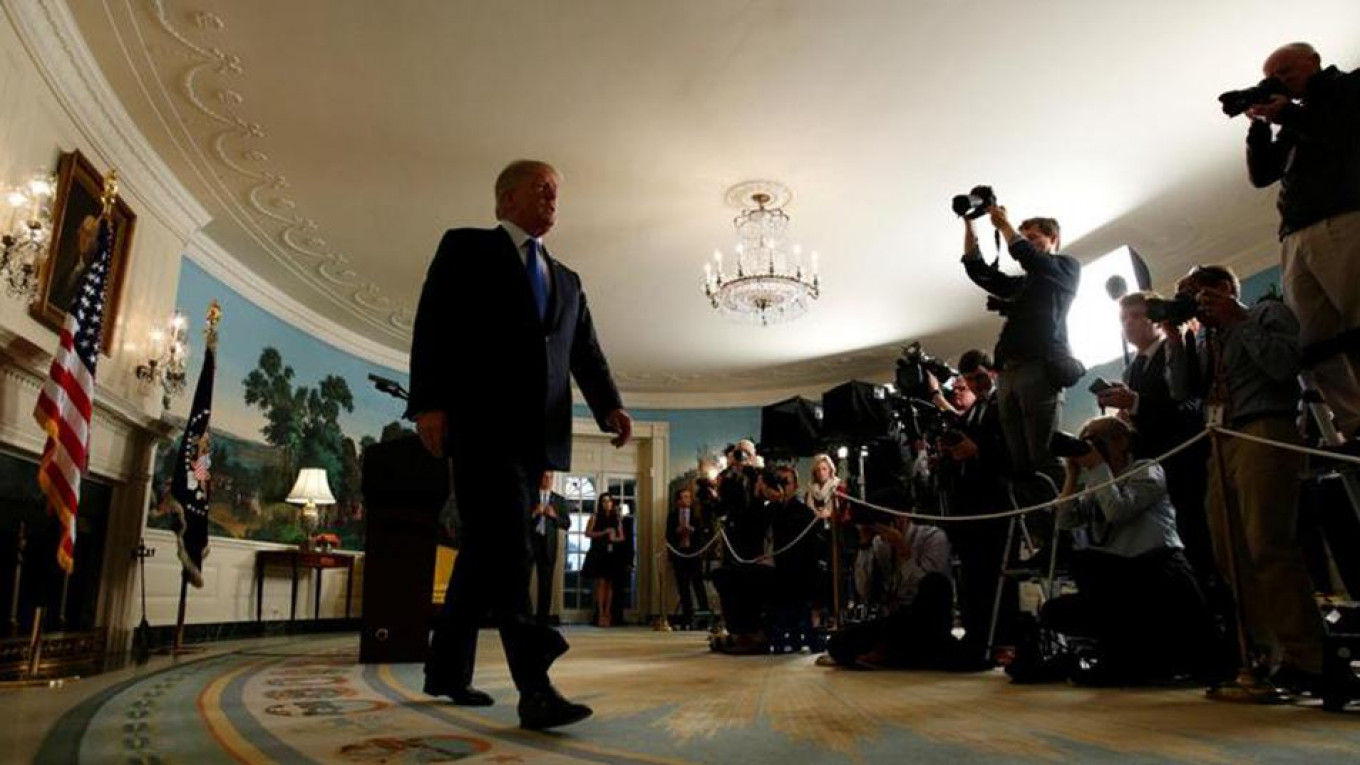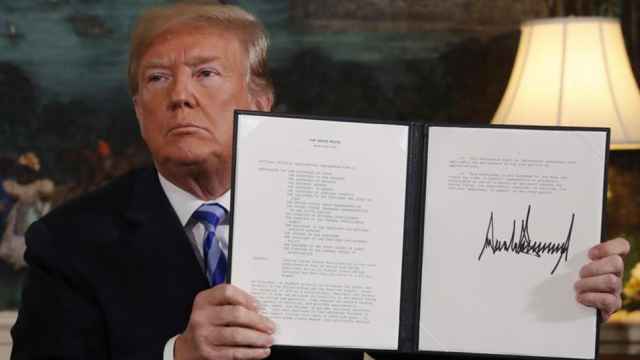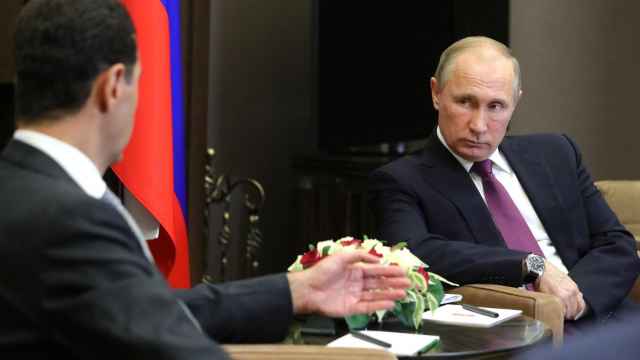As U.S. President Donald Trump prepares to withdraw from the Joint Comprehensive Plan Of Action (JCPOA) — known in Trump world as “Obama’s bad deal with Iran” — Moscow, surprisingly, has found itself on what might be called the right side of history.
It is a rare diplomatic moment that Moscow cannot help but relish.
Together with Europe, China and the International Atomic Energy Agency (IAEA), Russia fully supports the continued implementation of the JCPOA.
Indeed, the Trump administration has so far failed to offer a convincing argument for why the nuclear deal with Iran should be scrapped. For all intents and purposes, the deal has blocked Iran’s immediate pathways to the nuclear bomb with a rigorous verification regime. It’s worth noting too that the United States has failed to offer any proposals for an alternative, better deal.
Other than Trump’s personal dislike for Barack Obama’s legacy, the United States does not stand to gain by walking away from the JCPOA. There is in fact no U.S. win there, only a mounting tally of international losses. For Moscow, the Trump administration’s criticism of the Iran deal is incomprehensible and pure folly.
The U.S. intelligence community together with the IAEA says that Iran is complying with the terms of the deal, and since 2004 has not undertaken any work on building a nuclear weapon. This was spectacularly confirmed last week by Israel’s Prime Minister Benjamin Netanyahu when he unveiled the Israeli intelligence haul of Iran’s secret nuclear archives in a PowerPoint presentation that commentators said was itself pitched at Trump.
Iran's foreign minister, Javad Zarif, responded to the presentation referring to Netanyahu as the boy who cried wolf.
For all the theatrics, Netanyahu presented no evidence that Iran has been violating the JCPOA since 2015. Yes, Israel exposed Iranian leaders to be perennial liars for denying for years that their “peaceful nuclear energy program” was aiming to build nuclear weapons. But isn’t it what the JCPOA was negotiated for — to deny Iran a fast track to nukes with a tough inspection regime?
Of course, JCPOA did not aim to dismantle Iran’s nuclear program entirely, only to keep it within the declared peaceful bounds. That was the nature of compromise behind the deal. Iran joined as a signatory of the Treaty of the Non-Proliferation of Nuclear Weapons, meaning it is obliged not to develop or acquire nuclear weapons, but it does have the right to peaceful nuclear energy.
There are provisions within the JCPOA that Trump isn't happy with. For example, in 2025 Iran will get the right to use more efficient centrifuges to enrich uranium to fuel-grade — not weapons-grade — levels with strict limits and controls on the facilities and quantities allowed for enrichment stretching all the way to 2030.
JCPOA also does not directly address Iran’s missile program (Russia strongly objected to linking the two) but imposes an indirect prohibition on the development of nuclear weapons delivery systems, including ICBMs. There are other UN-imposed limits on Iran’s missile program until 2023.
And, of course, there was never going to be an opportunity to agree within the JCPOA framework on curbs to Iran’s malign activities in the Middle East. It simply could not be the subject of negotiations, much to the disapproval of Israel, Saudi Arabia and other Gulf nations.
Moscow has closely aligned itself with China and the EU in opposing U.S. moves against the JCPOA, with President Putin working to coordinate policy with President Emmanuel Macron of France and Chancellor Angela Merkel of Germany. The Iran nuclear deal provides a rare area of agreement between Russia and parts of the West.
Russia and China have issued a joint statement calling on all sides to implement their obligations under the deal. Similarly, Moscow and Beijing have been lukewarm to Macron’s plan to “maintain and improve” on the JCPOA with a set of separate side agreements between the United States and the EU.
Those add-ons would allow for punitive sanctions on Iran’s missile program and sanctioning Iran’s power projection in the region in return for the United States staying within the JCPOA. The efforts to negotiate such a deal are still continuing, but are likely to fall short with time running out and the United States insisting on phasing out the JCPOA provisions.
Moscow realizes that the Trump administration is likely to shoot itself in the foot and isolate the U.S. internationally were Trump to walk away from the JCPOA. From Moscow’s perspective, this is a silver lining. It weakens the U.S. position in the run-up to a highly anticipated Trump-Putin meeting, the details of which are still in the works.
Although it could be argued that in hopes of reaching a “grand bargain” with Trump on issues of real importance to Moscow, like Ukraine and sanctions relief, Russia might have been tempted to support Trump on JCPOA and distance itself from Iran, the reality is different.
Moscow is too dependent on Iran’s forces in Syria to ensure control and stabilization. It cannot afford to alienate its essential military ally on an issue where Iran’s position has more legitimacy in Moscow’s eyes than Washington’s.
The costs of sidling up to the United States are too high for Russia, especially when the geopolitical benefits of currying Trump’s fleeting favor are uncertain and have not even been dangled.
The best Moscow can do under the circumstances is to try to form a common position with the EU, China and Iran to keep the JCPOA in place irrespective of what the U.S. does in its moment of madness. Iran might even have its own reasons for staying in the deal too, like keeping economic channels with Europe, China and Russia open, for instance.
Were Iran to stay in at Russia’s urging, it would provide a rare diplomatic coup for Moscow.
Vladimir Frolov is a Russian political analyst and columnist. The views and opinions expressed in opinion pieces do not necessarily reflect the position of The Moscow Times.
A Message from The Moscow Times:
Dear readers,
We are facing unprecedented challenges. Russia's Prosecutor General's Office has designated The Moscow Times as an "undesirable" organization, criminalizing our work and putting our staff at risk of prosecution. This follows our earlier unjust labeling as a "foreign agent."
These actions are direct attempts to silence independent journalism in Russia. The authorities claim our work "discredits the decisions of the Russian leadership." We see things differently: we strive to provide accurate, unbiased reporting on Russia.
We, the journalists of The Moscow Times, refuse to be silenced. But to continue our work, we need your help.
Your support, no matter how small, makes a world of difference. If you can, please support us monthly starting from just $2. It's quick to set up, and every contribution makes a significant impact.
By supporting The Moscow Times, you're defending open, independent journalism in the face of repression. Thank you for standing with us.
Remind me later.








